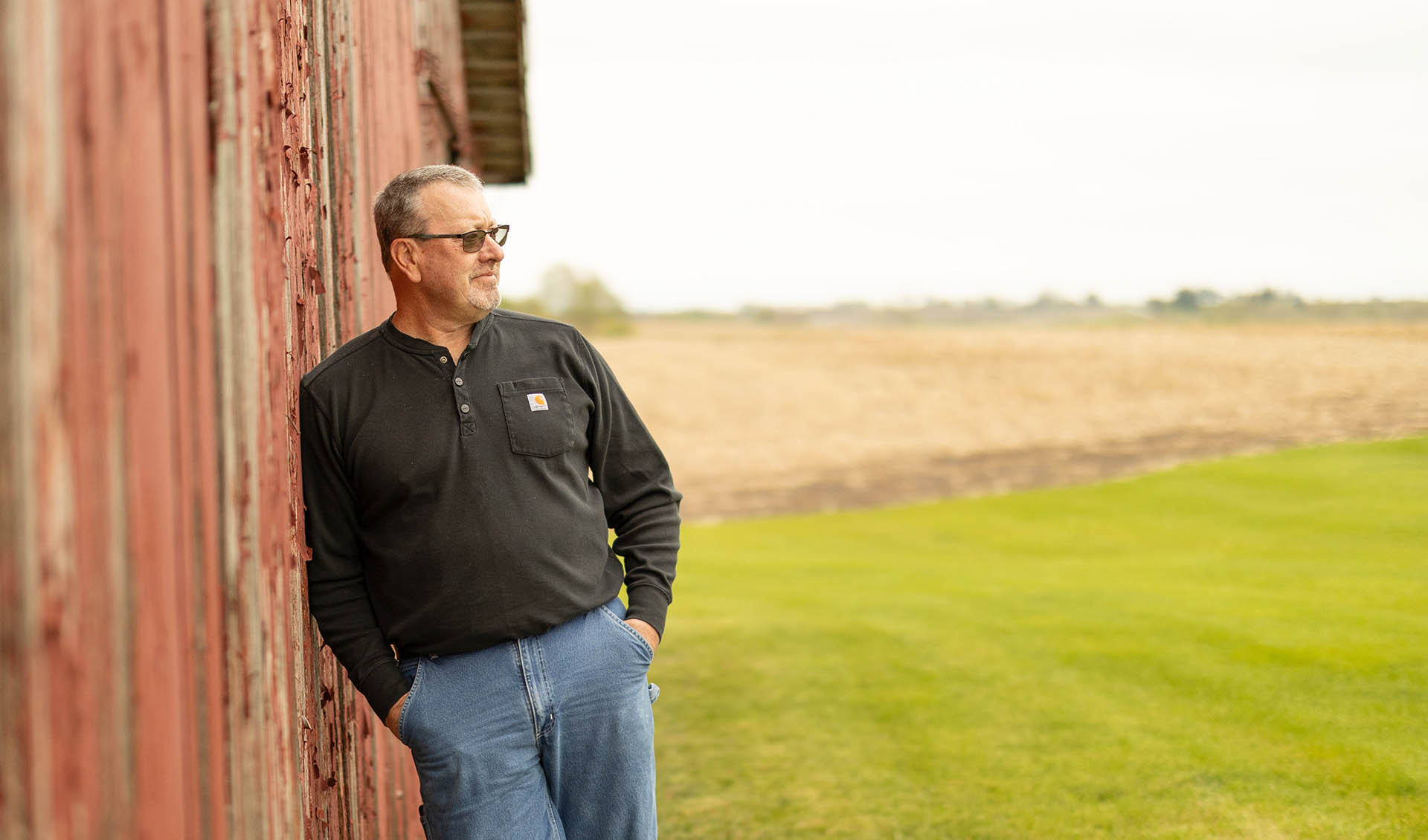
(Photo: Iowa Soybean Association / Joclyn Bushman)
Championing conservation with Iowa's Front 40
June 28, 2024
Being his own boss, deciding what to plant, when to plant, how to plant, implementing conservation practices — farming is not a job for Chuck Cleveland, it’s a calling.
Cleveland grows soybeans and corn in Warren County and has been out in the field since 1981. However, it wasn’t until the last several years he was able to devote all his time to the process. Previously, he worked in town, doing everything from hauling propane to working for John Deere over the course of 30 years.
But he’s fully entrenched in farming, committed to producing a dependable, quality crop, while protecting the soil and water.
Making a difference
“I’ve been no-tilling since about 1997 and finally started doing some of my own terracing and tiling projects around 2008,” he says.
That’s why the Front 40 program with the Iowa Soybean Association (ISA) has so much appeal to Cleveland.
The Front 40 impact
Front 40 is an ISA program that celebrates conservation champions in Iowa. It recognizes farmers and others who utilize and promote innovative conservation methods. The program also seeks to inspire further action in improving water and soil quality while illustrating how more public funding can dramatically increase the pace and scope of conservation activities in Iowa. To date, the Iowa Front 40 program has recognized 80 farmers and stakeholders across the state.
ISA is widely respected for implementing programs and services enabling soybean farmers to boost productivity in concert with effective conservation practices.
Front 40 connects farmers, landowners and conservationists around Iowa, and is a platform to honor and share these success stories, empower grassroots influencers to continue to advocate and educate policymakers about the benefits of long-term conservation that is locally led and locally relevant.
“We’re all about improving productivity, profitability and natural resource management for soil and water in Iowa,” says Roger Wolf, director of conservation at ISA’s Research Center for Farming Innovation. “The Front 40 captures the voices of local champions to advocate what’s been going on across Iowa for soil and water conservation for the purpose of replicating that success in other parts of the state.”
Championing conservation
A long-time farmer-member of the ISA, Cleveland says terracing and tiling are especially important to his operation; he no-tills nearly every acre because he knows the long-term benefits of protecting soil and water resources.
“I like what Front 40 does for conservation, and I’ve done a fair amount of it,” he says.
As a farmer, Cleveland says he enjoys every aspect of the cropping process.
“I like planting it, watching it grow, the harvesting, working with agronomists,” he says. “I enjoy the technology side of things — that intrigues me a lot.”
Being his own boss, Cleveland reiterates, is important to him, especially after working for others in previous years.
“I like making the day-to-day decisions,” he says. “There’s a great deal of satisfaction — I do all the planting, all the harvesting, making decisions on seed and where to tile. It’s having the ability to know that the buck stops here with me.”
Admittedly, being your own boss can be stressful, but as Cleveland says when things go well the wins are even sweeter and the rewards that much greater. In 2023, he says he attained strong yields on his fields and that’s more than a comforting feeling for him.
Cleveland says Front 40 presents opportunities for farmers like him through idea sharing.
“I’m looking forward to the networking and seeing what other farmers are doing out there,” he says.
Soy’s future
Cleveland is looking forward to growth opportunities in the soybean industry in the years to come.
“We haven’t reached all the benefits of what renewable fuels can do,” he says. “The world is still growing and that’s intriguing. Demand is going to be bigger.”
And with the advancements in technology and genetics, yields will be even greater.
“When I first started farming, 35-bushel beans were the benchmark. Now we’re at 60-65 bushels,” he says. “I think we might see 100-bushel soybeans someday.”
To learn more about Front 40, go to iowafrontforty.com.
Back